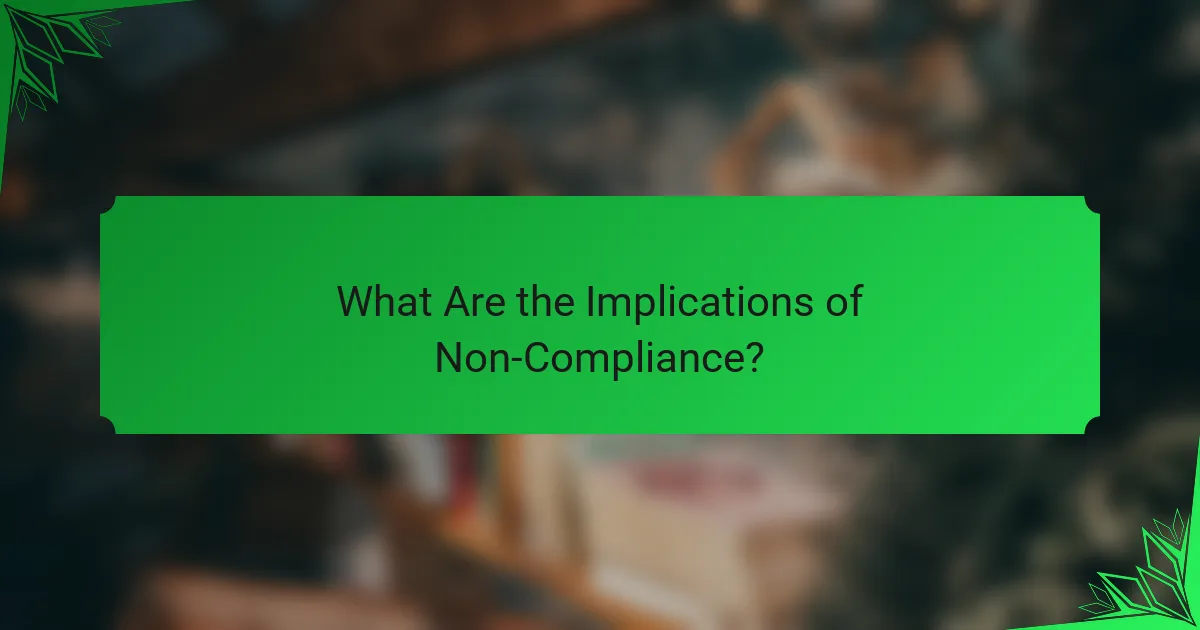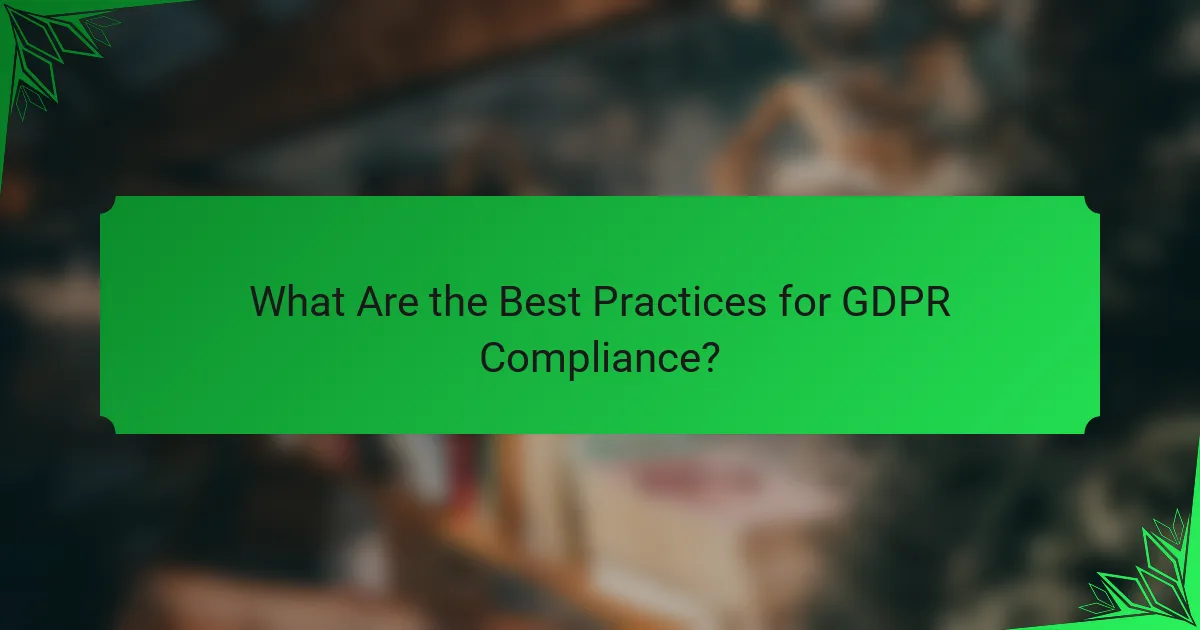The General Data Protection Regulation (GDPR) establishes essential requirements for organizations to protect personal data and uphold the rights of individuals. Compliance involves implementing measures such as obtaining user consent, maintaining accountability, and notifying authorities of data breaches. Failure to adhere to these regulations can result in significant financial penalties and damage to an organization’s reputation, making it vital for businesses to understand and navigate these requirements effectively.

What Are the Key Requirements for GDPR Compliance?
The General Data Protection Regulation (GDPR) outlines several key requirements that organizations must follow to ensure compliance. These include adhering to data protection principles, respecting the rights of data subjects, maintaining accountability, notifying authorities of data breaches, and establishing data processing agreements.
Data Protection Principles
The GDPR sets out fundamental data protection principles that govern the processing of personal data. These principles include lawfulness, fairness, and transparency; purpose limitation; data minimization; accuracy; storage limitation; integrity and confidentiality; and accountability. Organizations must ensure that they collect and process data in a manner that aligns with these principles.
For example, data should only be collected for specific, legitimate purposes and must not be retained longer than necessary. Companies should regularly review their data processing activities to ensure compliance with these principles.
Rights of Data Subjects
Under GDPR, individuals have specific rights regarding their personal data. These rights include the right to access, the right to rectification, the right to erasure (also known as the right to be forgotten), the right to restrict processing, the right to data portability, and the right to object to processing. Organizations must be prepared to facilitate these rights upon request.
For instance, if a data subject requests access to their data, organizations must provide this information within a month. Failure to comply with these rights can lead to significant penalties.
Accountability and Governance
Accountability is a core requirement of GDPR, mandating that organizations demonstrate compliance with the regulation. This involves implementing appropriate technical and organizational measures to protect personal data and maintaining documentation of processing activities. Companies should appoint a Data Protection Officer (DPO) if required, to oversee compliance efforts.
Regular training for staff on data protection practices is essential to foster a culture of compliance. Organizations should also conduct Data Protection Impact Assessments (DPIAs) for high-risk processing activities to identify and mitigate potential risks.
Data Breach Notification
GDPR requires organizations to notify the relevant supervisory authority of a data breach within 72 hours of becoming aware of it, unless the breach is unlikely to result in a risk to the rights and freedoms of individuals. Additionally, affected individuals must be informed if the breach poses a high risk to their rights.
To comply, organizations should have a clear incident response plan in place, detailing the steps to take in the event of a data breach. This plan should include identifying the breach, assessing its impact, and notifying the necessary parties promptly.
Data Processing Agreements
When organizations engage third parties to process personal data on their behalf, they must establish Data Processing Agreements (DPAs). These agreements outline the responsibilities and liabilities of both parties concerning data protection and ensure that the third party adheres to GDPR standards.
Key elements of a DPA should include the scope of data processing, security measures, and conditions for sub-processing. Organizations should regularly review these agreements to ensure compliance and make necessary updates as regulations evolve.

How to Achieve GDPR Compliance for Digital Products?
To achieve GDPR compliance for digital products, organizations must implement specific measures that protect user data and ensure transparency. This involves understanding data processing activities, obtaining user consent, and regularly auditing compliance efforts.
Conduct Data Protection Impact Assessments
Data Protection Impact Assessments (DPIAs) are essential for identifying and mitigating risks associated with data processing activities. Organizations should conduct DPIAs when initiating new projects that involve personal data to assess potential impacts on privacy.
A DPIA typically includes a description of the processing, an assessment of necessity and proportionality, and measures to address risks. It is advisable to document the findings and consult with relevant stakeholders to ensure comprehensive evaluation.
Implement Privacy by Design
Privacy by Design is a principle that integrates data protection into the development process of digital products. This means considering privacy at every stage, from conception to deployment, ensuring that user data is safeguarded by default.
To implement this, organizations should adopt practices such as minimizing data collection, using encryption, and providing users with clear privacy notices. Regular training for development teams on privacy principles can also enhance compliance efforts.
Establish Consent Mechanisms
Establishing clear and effective consent mechanisms is crucial for GDPR compliance. Organizations must ensure that users provide explicit consent before their data is processed, with the option to withdraw consent at any time.
Consent requests should be concise, transparent, and easy to understand. Providing users with granular choices regarding their data can enhance trust and compliance, while pre-ticked boxes or vague language should be avoided.
Regular Compliance Audits
Conducting regular compliance audits is vital for maintaining GDPR adherence. These audits help identify gaps in data protection practices and ensure that policies are being followed effectively.
Organizations should establish a schedule for audits, ideally on an annual basis, and involve cross-functional teams to evaluate compliance across departments. Documenting the audit process and outcomes can provide valuable insights for continuous improvement.

What Are the Implications of Non-Compliance?
Non-compliance with GDPR can lead to severe repercussions for organizations, affecting their finances, reputation, and legal standing. Understanding these implications is crucial for any business operating within or dealing with the European Union.
Financial Penalties
Organizations that fail to comply with GDPR can face hefty financial penalties. Fines can reach up to €20 million or 4% of the annual global turnover, whichever is higher. This significant financial burden can cripple small to medium-sized enterprises and affect larger companies as well.
To mitigate the risk of penalties, businesses should conduct regular audits of their data protection practices and ensure they are aligned with GDPR requirements. Investing in compliance training and resources can also help avoid costly mistakes.
Reputational Damage
Non-compliance can severely damage a company’s reputation, leading to a loss of customer trust and loyalty. Customers are increasingly aware of data privacy issues and may choose to take their business elsewhere if they perceive a company as negligent in protecting their personal data.
To protect their reputation, companies should be transparent about their data handling practices and actively communicate their commitment to compliance. Engaging with customers about data protection can foster trust and enhance brand loyalty.
Legal Consequences
Beyond financial penalties, non-compliance can lead to legal actions from individuals or regulatory bodies. Affected individuals may file lawsuits for damages resulting from data breaches or misuse of their personal information.
To avoid legal consequences, organizations should implement robust data protection measures and maintain clear documentation of their compliance efforts. Regularly reviewing and updating privacy policies can also help ensure that legal obligations are met and reduce the risk of litigation.

How Is GDPR Enforced in the UK?
In the UK, GDPR enforcement is primarily managed by the Information Commissioner’s Office (ICO), which oversees compliance and addresses violations. The ICO has the authority to investigate organizations and impose penalties for non-compliance with data protection regulations.
Role of the Information Commissioner’s Office
The Information Commissioner’s Office (ICO) is the UK’s independent authority set up to uphold information rights. It provides guidance on GDPR compliance, conducts investigations, and has the power to issue fines for breaches. Organizations must register with the ICO if they process personal data, ensuring transparency and accountability.
The ICO also offers resources and tools to help businesses understand their obligations under GDPR, including templates and best practice guides. Engaging with the ICO can help organizations avoid potential pitfalls and ensure they meet legal requirements.
Investigation Procedures
The ICO can initiate investigations based on complaints from individuals or through its own monitoring activities. When a potential breach is identified, the ICO may conduct a preliminary assessment to determine if further action is warranted. This can include reviewing documentation, interviewing staff, and examining data handling practices.
Organizations are required to cooperate with the ICO during investigations, providing necessary information and access to relevant systems. Failure to comply with an investigation can lead to additional penalties or enforcement actions.
Enforcement Actions
If the ICO finds that an organization has violated GDPR, it can impose various enforcement actions. These may include issuing warnings, reprimands, or fines that can reach up to £17.5 million or 4% of annual global turnover, whichever is higher. The severity of the penalty often depends on the nature of the violation and the organization’s level of cooperation.
In addition to financial penalties, the ICO can also mandate changes to data handling practices, require audits, or even impose restrictions on data processing activities. Organizations should take these potential consequences seriously and ensure compliance to avoid significant repercussions.

What Are the Best Practices for GDPR Compliance?
Best practices for GDPR compliance focus on transparency, data protection, and user rights. Organizations should implement clear policies, conduct regular audits, and ensure robust data security measures to protect personal information.
Data Mapping and Inventory
Data mapping involves identifying and documenting all personal data processed by an organization. This includes understanding where data is stored, how it is used, and who has access to it. A comprehensive inventory helps in assessing compliance and identifying potential risks.
Regularly updating this inventory is crucial, especially when new data processing activities are introduced. Use tools or software that facilitate data mapping to streamline the process and ensure accuracy.
Privacy Notices
Privacy notices must be clear, concise, and accessible to individuals whose data is being collected. These notices should explain the purpose of data collection, the legal basis for processing, and the rights of the data subjects. Transparency builds trust and ensures compliance with GDPR requirements.
Consider using plain language and avoiding legal jargon in privacy notices. Regularly review and update these notices to reflect any changes in data processing activities.
Data Protection Impact Assessments (DPIAs)
DPIAs are essential for identifying and mitigating risks associated with data processing activities. Conduct a DPIA when initiating new projects that involve personal data, especially if they pose high risks to individuals’ rights and freedoms.
Document the findings of the DPIA and implement measures to address any identified risks. This proactive approach not only aids compliance but also enhances overall data protection strategies.
Training and Awareness
Regular training for employees on GDPR compliance is vital. Ensure that all staff members understand their responsibilities regarding data protection and the importance of safeguarding personal information.
Consider implementing ongoing training programs and awareness campaigns to keep data protection at the forefront of organizational culture. This helps prevent data breaches and ensures that everyone is aligned with compliance efforts.
Incident Response Plan
Having a robust incident response plan is crucial for managing data breaches effectively. This plan should outline the steps to take in the event of a breach, including notification procedures and mitigation strategies.
Regularly test and update the incident response plan to ensure its effectiveness. Familiarize all relevant personnel with their roles in the event of a data breach to minimize potential damage and ensure compliance with GDPR notification requirements.
